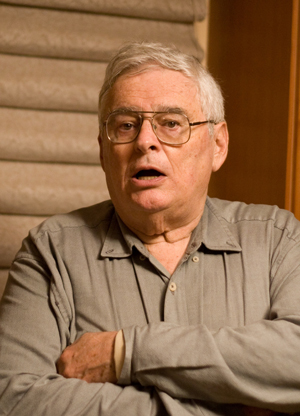
Your complimentary articles
You’ve read one of your four complimentary articles for this month.
You can read four articles free per month. To have complete access to the thousands of philosophy articles on this site, please
Obituary
Jerry Fodor (1935-2017)
Daniel Hutto says goodbye to a memorable philosophical sparring partner.
Jerry Fodor was forever forecasting and combating a doom-and-gloom return to what he regarded as the dark days of behaviourism in the philosophy of mind. Yet he never mentioned the darkness that would befall philosophy at his own demise, from the loss of his systematic exploration and defence of controversial lines of argument, his inexhaustible intellectual energy, and his playful wit. Sadly, that day has come.
A prominent theme in his many obituaries has been to acknowledge Fodor’s virtue as an unflagging philosophical opponent. He was the perfect, utterly resilient, sparring partner. One could always and absolutely count on him to put forward the strongest argument for the position he advanced without quibble or qualification. Comparing him to a trampoline, Daniel Dennett spoke of our being able to see further by “jumping on Jerry.” Ruth Millikan once compared him to Mister Toad in Wind in the Willows, observing that he blithely crashed one theory after another, only to rush off to the next with equal enthusiasm and a cavalier shout of “Poop-poop!”
His penchant for playful adventure and dogged, serious commitment to working out a systematic philosophical position – a revived rationalism – speaks from the pages of his many, many books. The constant, enduring theme of Fodor’s writings is a defence of mentalism (the idea that mental states are real and causally efficacious) against the threat of behaviourism and pragmatism. Fodor is forever resisting the philosophical approaches of Gilbert Ryle and Ludwig Wittgenstein, root and branch. As a founding father and champion of the cognitive science revolution, Fodor first advanced the case for mentalism in 1968 with his ground-breaking Psychological Explanation. In his final effort, Minds Without Meaning, co-authored with Zenon Pylyshyn in 2015, he still expresses his commitment to that vision, though now cast in a new format.

Jerry Fodor
Photo © Pealco 2007
Today many philosophers and cognitive scientists depart from specific details of the various ways Fodor fleshed out mentalism over the years. They may baulk at his commitment to nativism (the view that cognitive mechanisms and concepts are innate); or to the idea that thinking takes place in a ‘language of thought’; or to there being specialized, self-contained mental modules. Nevertheless, in many cases, those departures are only as clearly defined as they are thanks to the comparisons that can be made with Fodor’s proposals. More fundamentally, but less obviously, Fodor succeeded in his efforts to help revive mentalism and establish it as the now-default mainstream position in analytic philosophy of mind and cognitive science. His systematic campaign of providing a series of sustained, unremitting arguments in favour of the idea that behind-the-scenes mental causes of some kind best explain intelligent behaviour is, without doubt, Fodor’s true and indelible intellectual legacy. Even those like myself who defend the opposite view, and lament the restoration and rise of mentalism cannot fail to acknowledge the great debt philosophy of mind owes Fodor in this regard. Fodor was a formidable philosophical force and his influence will continue to be felt in times to come.
For those not embroiled in these debates, no doubt Jerry Fodor will be remembered for his cheeky – indeed, tongue-in-cheeky – writing style more than for his substantive philosophical theories. He had a wonderfully irreverent way of concisely setting issues on a larger canvas by introducing us to a cast of characters: Auntie, Granny, Greycat, Snark, and others. His work is a welcome relief from more sober and serious styles of doing philosophy. Although not everyone is a fan of his playful way of writing, I for one wholly applaud it, as protection against taking ourselves too seriously, and because it allows no room for arguing from authority. His style also allows us to focus quickly and firmly on what really matters. Rob Rupert put it well in a review, noting that “these devices allow Fodor to get at the meat of issues without the circuitous ado.”
Fodor was generous in responding to argument, and could be tough with his opponents. At the end of a prolonged exchange I had with him once about the origins of intentional psychology, he wrote “I’ll bet a nickel (maybe even a dime; what the hell) that, if you assume that [children] don’t start with [an intentional psychology], any attempt to explain how they might acquire one would find itself up to its ears in circularities.” But he was equally willing to apply the same standards to his own work, and to go wherever an argument took him. This is classic Fodor, on representational theories of mind (RTM); a view he long defended:
“This begins to seem a little worrying. It is perhaps tolerable that representational theories of mind should lead by plausible arguments to quite a radical nativism. But it is surely not tolerable that they should lead by plausible arguments to a contradiction… the conclusion has to be that there aren’t any primitive concepts. But if there aren’t any primitive concepts, then there aren’t any concepts at all. And if there aren’t any concepts [at] all, RTM has gone West. Isn’t it a bit late in the day (and late in the book [p.132 of 174]) for me to take back RTM? Help!”
Concepts: Where Cognitive Science Went Wrong, OUP (1998)
Whatever we think of his views or of the famous Fodor flair and flourish, we should all seek to emulate his intellectual openness and honesty. He will be sorely missed, but never forgotten.
© Professor Daniel D. Hutto 2018
Daniel Hutto is Professor of Philosophical Psychology at the University of Wollongong.









